Review of March 25, 2015
“Extraordinary Advances” Against Cancer:
New Fred Hutch President Keynotes March 25 Meeting
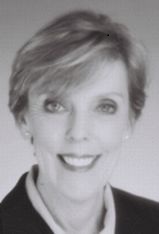
Reporter: Jeanne McKnight
We are on the threshold of extraordinary advances in the way we treat cancer….a tsunami of approaches that harness our own immune systems to benefit patients….It is stunning to see. I’ve never seen anything like it. – Dr. Gary Gilliland
For those in the audience at Wednesday’s meeting at Benaroya Hall, music and breakthroughs in medicine were on the agenda, making for an extraordinary program from the very beginning—when President Tom called the meeting to order. Making a link to the main program, song-leader Sarah Lewontin explained why she chose “America the Beautiful” as the anthem for the day: Her husband, who once battled lymphoma, has been cancer-free for two years, she said. Lewontin was followed by Joel Paget, who gave a very personal invocation, which was a prayer/poem that told the story of his own battle with lymphoma and its successful treatment.
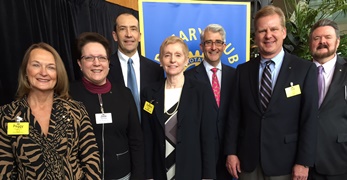 Following the introductions of new members Cynthia Bush, Ted Fick, and Peggy Flynn by Joe Phillips, Bill Bryant, and Jane Pryor, respectively, Kathy Fahlman DeWalt, Seattle Symphony Board member and founder of the “Ten Grands” program, introduced one of this year’s Ten Grands winners, pianist Arthur Migliazza, who brought the house down with his energetic Blues and Boogie Woogie performance.
Following the introductions of new members Cynthia Bush, Ted Fick, and Peggy Flynn by Joe Phillips, Bill Bryant, and Jane Pryor, respectively, Kathy Fahlman DeWalt, Seattle Symphony Board member and founder of the “Ten Grands” program, introduced one of this year’s Ten Grands winners, pianist Arthur Migliazza, who brought the house down with his energetic Blues and Boogie Woogie performance.
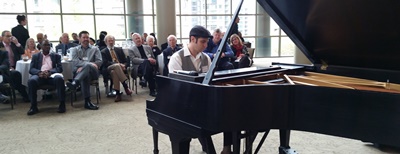 For those who may have been wondering how to top Migliazza’s piano-playing virtuosity, the answer was soon made clear, when Karl Ege introduced our main speaker. Acknowledging both the extraordinary work of the Fred Hutchinson Cancer Research Center, and that of its new leader, Dr. Gary Gilliland, Ege pointed out the strength of Dr. Gilliland’s professional experience as well as his connections to research being conducted here.
For those who may have been wondering how to top Migliazza’s piano-playing virtuosity, the answer was soon made clear, when Karl Ege introduced our main speaker. Acknowledging both the extraordinary work of the Fred Hutchinson Cancer Research Center, and that of its new leader, Dr. Gary Gilliland, Ege pointed out the strength of Dr. Gilliland’s professional experience as well as his connections to research being conducted here.
Dr. Gilliland made it clear when he took to the podium that this place at this time is exactly where he needs and wants to be: “Coming to Fred Hutch feels like coming home,” he said, adding that “I’ve been working up to this opportunity my whole life.”
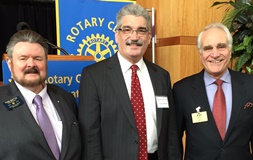 A bit about the new leader of the Hutch: He spent 20 years on the faculty at Harvard Medical School, worked at the Howard Hughes Medical Institute, then headed up the leukemia program at the Dana-Farber/Harvard Cancer Center before going to Merck Research Laboratories.
A bit about the new leader of the Hutch: He spent 20 years on the faculty at Harvard Medical School, worked at the Howard Hughes Medical Institute, then headed up the leukemia program at the Dana-Farber/Harvard Cancer Center before going to Merck Research Laboratories.
A few interesting facts about the Hutch:
• It was founded 40 years ago by Bill Hutchinson after his brother, Fred, died of cancer
• It is the only cancer research center named after a major league baseball player
• It has “the best outcomes of any transplant center in the world”
• Its “mantra” is “Cures Start Here”
• The goal is no longer to “treat”: “We are thinking about how to cure” cancer
• The most promising advance is that of harnessing the immune system—“teaching the immune system to go after tumors.” (Or, to put it another way: “We’ve learned to flip the switch on the immune system and cause tumors to vaporize.”)
• It’s all about collaboration: The Hutch partners with UW medicine and Seattle Children’s – and treats patients at SCCA
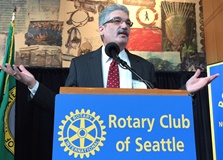 There are five scientific divisions, including basic cancer research (“our core”); Vaccine and Infectious Disease Division; Global Oncology; HIV Trials Network (the largest vaccine trial network in the world); and Public Health, looking at the epidemiology of cancer.
There are five scientific divisions, including basic cancer research (“our core”); Vaccine and Infectious Disease Division; Global Oncology; HIV Trials Network (the largest vaccine trial network in the world); and Public Health, looking at the epidemiology of cancer.
Explaining the work of the public health division, Dr. Gilliland pointed out one project that looks at best practices in women’s health. The study in question, he said, cost $500,000 but saved some $37 billion in costs of treatment.
While the Hutch has been “modest about our accomplishments,” it is likely that under the leadership of Dr. Gilliland, we can likely expect to see some of that modesty fall away—particularly in an era of decreased funding from the National Institutes of Health (NIH), and also a long timeframe to even such a grant (12-18 months). “It takes a lot of effort” to go that route, he asserted.
Instead, we’re looking more at donors and philanthropists, similar to the approach being taken in Portland, where Nike’s founder, Phil Knight, has issued a matching grant challenge that will net the Oregon Health Sciences University $1B when and if it is successful. OHSU is poised to hire 300 cancer researchers as a result of this effort, he said.
But, Dr. Gilliland added, “we will weather the NIH funding slide,” in part because the Hutch is having a record philanthropic year and has in place the infrastructure to help patients today by providing access to curative therapies.
In the final analysis, it all begins and ends with patients, he notes—and there is urgent work to be done: “There are people dying of cancer as we speak here at our Rotary function,” he said.
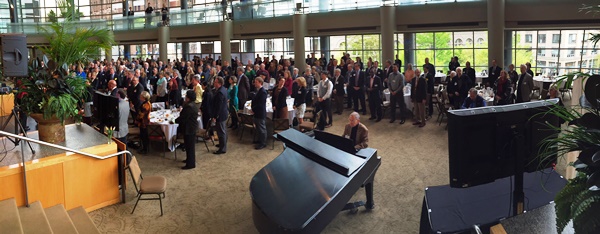
Download the website sponsorship guide
